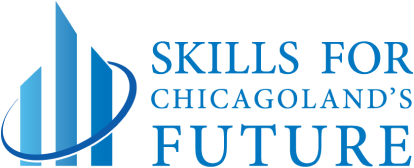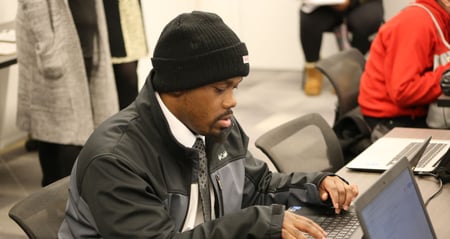You’ve made it through your interview with Skills, and you’re now on to your interview with the company’s hiring manager. Congrats! You may now be wondering, “What next? What should I do to prep?” No worries! Christopher has you covered with Skills’ best advice and favorite tips for preparing before your job interview.
1. Research the Company and Understand the Position Inside and Out
Skills recruiters give you as much information as possible about the company and the position during your interview with us, but there’s more you should research before your interview.
- Understand the company’s mission, values, and overall business goals. This is important for all jobs, and it’s especially necessary for jobs in the sales, finance, and customer service industries. I suggest reading the “About Us” or “Who We Are” sections of the company’s website. Also, check out their social media profiles to see what they view as important (general industry news, company news, etc.) and to get an idea of what makes them proud (business growth, employee recognition, etc.).
Why? You’ll get a better idea of what’s important to them and why they do what they do. You’ll also be able to “speak the company’s language” in your answers, showing that you value the same things as them and want to uphold their mission and goals in this new role.
- Learn more about the company culture. You must like something about the company if you applied for the job, but you still want to ensure this is a job you’ll enjoy doing at a place you’ll love. I like to look at Glassdoor or Indeed to see what current and past employees have said about working at the company. Anything can be said on the Internet, of course, so I recommend using these sites not as sources of facts, but instead as ways to uncover common themes on the work and company culture.
Why? Like you, the hiring manager wants to make sure you will fit easily into the role, team, and company. Use what you’ve learned about the company’s culture to play up your strengths in your answers and show why you’re a great fit.
- Know every single detail in the job description. Through your Skills interview, you should have a good idea of what the job entails. Try to memorize the job description as best as possible, and then try to find more information on the company’s website about the department/unit where you’ll be working. If you use LinkedIn, search for people at the company with the same job title to get a better insight into what you’ll actually be doing in the role. Glassdoor is another great resource for this.
Why? You want to ensure the hiring manager you fully understand the job and the responsibilities that come with it. Don’t let them think that you are uncertain of what you’ll be doing or won’t be able to perform the job well.
2. Practice Makes Perfect
During your interview at Skills, you’ll get a good idea of how your interview will be structured and the types of questions you’ll be asked. Here are a few key things I think are important to practice before your big day.
- Create solid answers for these questions: “Why do you want to work at Company X?” and “Why are you interested in this role?” You’ve already told your Skills recruiter “why,” but now is the time to make your answer memorable for the hiring manager. I recommend drawing on past experiences that led you to apply for this role with this company, and even mention how this job fits into your career goals. Using your research on the company’s mission, culture, etc., stress why this company is better than another company.
Why? Trust me, these questions will be asked (the “Tell me about yourself” question serves the same purpose), and they’re typically the first questions you’ll get. The hiring manager does want to know about you, but they also want to know that you know about them. Compose a great answer so you start the interview with a strong, confident response that helps you stand out and sets you up for success for the interview.
- Think of specific examples from past experiences for behavioral based interview questions. One of my favorite tips is to have at the ready a few past professional experiences that address each of these ideas: leadership, teamwork, work ethic, innovation, problem solving, and conflict resolution. Depending on the type of job, you may be asked more than one question on each topic. For example, an inside sales job interview may have a few questions about innovation, conflict, and problem solving, while a retail job interview may have a few questions on work ethic and teamwork. Skills recommends using the STAR method to turn your examples into great answers.
Why? The key to being successful in your interview is to answer every question with a good example and clear delivery. To do that, you must anticipate and practice what to say. By having a few examples for each of these topics, you won’t be thrown off guard by what or how a question is asked. You’ll also be able to demonstrate through multiple positive experiences that you are the best candidate for the role.
- Say your answers aloud. While you may have answers that seem great in your head or on paper, ask friends, family, neighbors, your Skills recruiter, etc. to listen to your answers and provide feedback. Try to sound natural, not like a robot. Skills recruiters love to offer advice during our onsite interviews, and we’re more than happy to schedule a time to go over answers with you and offer additional feedback before you head to your interview.
Why? You may be told, and will even hear for yourself, that something you thought was good could be improved or streamlined. Remember, this exercise is meant to be constructive and helpful, not critical and judgmental.
3. Gather What You Need to Bring the Night Before
You are likely to be nervous and excited the morning of your interview. I know when I’m nervous-excited, I’m more likely to forget simple things. To make sure you show up to your interview fully prepared, grab a folder and collect what you know you’ll need to take with you.
- Have clean copies of your resume. Bring at least three copies to your interview, unless your Skills recruiter says otherwise. If you need a few copies printed, just let your recruiter know.
Why? The hiring manager may have a copy already printed, but if not, you can offer one to her or another interviewer. You can also use a copy as a cheat sheet when answering questions; just highlight or underline points that you want to make sure not to forget.
- Prepare insightful questions to ask the interviewer. While most of the interview will be spent with you being asked the questions, interviewers like to end the interview with the question, “Do you have any questions for me?” You always want to say, “Yes.” I suggest writing or typing out a list of your questions in order of importance, and pull the list out when the time is right. Just make sure you’re listening throughout the interview so that you don’t ask a question about something the hiring manager already mentioned.
Why? It’s important to ask about 2-3 questions, especially ones that incorporate the research you did. Interviewers make hiring decisions as much from the questions you ask as from the answers you give. If you don’t have questions, you’ll come off as uninterested and unprepared. To convince the hiring manager that you really want the job, you must show that you care about the company’s welfare and are eager to learn more. This is your final chance to do that in the interview.
- Map out directions to the interview. Make sure you know how to get to the interview site and how long it’ll take. It’s a good idea to do a test run if you can. You don’t want to be late or go to the wrong location.
Why? You want to have an estimate of travel time so you know when to leave for the interview. Remember to always add extra time for traffic or other unexpected circumstances. It’s best to arrive early rather than late.
- Grab a notepad and a working pen. This is not required for every interview, but it’s nice to have in case an idea pops into your head or the hiring manager says something you want to remember to mention later in the interview.
Why? You’ll appear more prepared and engaged if you’re jotting down a few notes during the interview. Do not write everything down, though, as you’ll come off as disengaged and uninterested. In case you fidget with your hands when nervous, this could be a good way to help with that during the interview. You can also jot down a recap after the interview so you don’t forget any new or important details.
Now, it’s time to pick out your outfit and get a good night’s sleep. You’ll want to be well-rested so that you perform your best during your interview.



